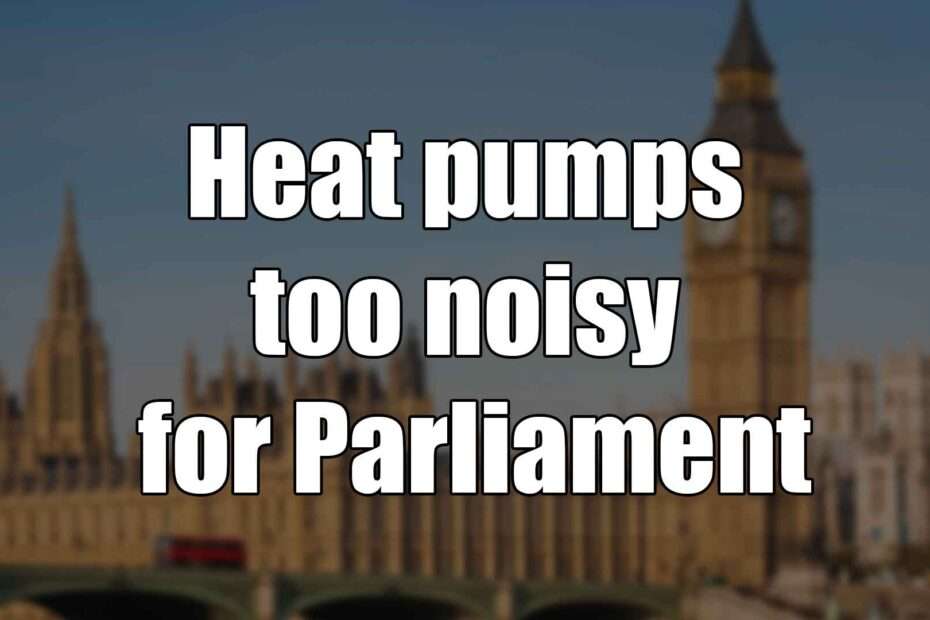Heat pumps too noisy for Parliament
Parliament’s Heat Pump Initiative Halted Following Noise Concerns
Labour Party Faces Accusations of Double Standards as Power Supply and Acoustic Issues Present ‘Significant Risk’
The Houses of Parliament’s ambitious scheme to transition to heat pump technology has been temporarily suspended amidst mounting concerns regarding noise emissions and operational efficiency, The Telegraph has learnt through exclusive investigation.
According to records obtained through Freedom of Information requests, whilst three air source heat pumps have been successfully installed within the House of Commons estate, no further installations have proceeded since 2022. This revelation comes at a particularly sensitive moment for the Government’s green energy agenda.
A comprehensive feasibility study—exclusively obtained by The Telegraph—examining the potential installation of additional heat pump infrastructure within Portcullis House, the modern parliamentary office complex, has highlighted considerable reservations regarding both acoustic impact and electrical supply capabilities. The findings present a significant challenge to the broader governmental push towards sustainable heating solutions.
The situation has catalysed fresh controversy for the Labour Party, with opposition members suggesting the difficulties encountered within Parliament itself serve as demonstrable evidence that heat pumps may not be suitable for widespread residential deployment. This stands in stark contrast to the Government’s continued advocacy for domestic installations.
Richard Tice, representing the Reform Party, offered a particularly pointed critique: “The Parliamentary estate’s experience with just three heat pumps has been fraught with difficulties, generating consistent complaints about excessive electricity consumption and noise pollution. Yet remarkably, Labour continues to advocate for nationwide adoption whilst appearing reluctant to embrace the technology within their own workplace environment.”
Tice further emphasised the disconnect between political leadership and public sentiment: “This situation perfectly exemplifies the growing chasm between our political establishment and the everyday experiences of British citizens.”
Conservative MP Greg Smith provided additional commentary, stating: “This serves as an unequivocal demonstration of heat pumps’ practical limitations. Nevertheless, Labour persists in attempting to mandate their adoption, potentially leaving citizens both financially strained and thermally uncomfortable.”
The practical implications of these challenges have become increasingly apparent within Parliament itself. One parliamentary staff member, speaking on condition of anonymity, revealed that Portcullis House consistently struggles to maintain comfortable working temperatures, leading to widespread dissatisfaction among employees regarding their working environment.
The Parliamentary estate’s journey with heat pump technology began in 2015 with its inaugural installation, followed by two additional units in 2022. However, the most recent feasibility study, conducted by renowned energy consultancy firm Troup Bywaters and Anders in July 2024, has raised serious concerns despite recommending air source heat pumps (ASHPs) for Portcullis House.
The consultants’ report explicitly highlighted power supply and acoustic considerations as “the most prominent risk factors requiring immediate attention.” Their assessment continued with a notable caveat: “Whilst we maintain our recommendation for ASHPs, we must emphasise the need for careful consideration and strongly advocate for the exploration of alternative power solutions.”
Interestingly, specific details regarding the location of both existing and planned heat pump installations were withheld from public disclosure, with House of Commons officials citing national security considerations as the primary justification for this information restriction.
The controversy surrounding heat pump technology extends well beyond Parliament’s walls. Homeowners across the country have consistently raised concerns regarding operational noise levels, which can reach up to 60 decibels—comparable to normal conversation levels—and the substantial space requirements for installation.
Labour’s decision in November of the previous year to relax planning regulations for heat pumps, permitting installation within one metre of neighbouring properties, has added another layer of complexity to the ongoing debate.
The Government maintains ambitious targets for heat pump adoption, aiming to achieve 600,000 annual installations by 2028. To facilitate this objective, they have implemented controversial measures including a “boiler tax” penalising installers who fail to meet specified targets.
The financial implications for homeowners remain significant, with heat pump systems typically commanding approximately £10,000 without subsidies, presenting a stark contrast to traditional gas boilers costing around £3,000.
A spokesperson for the UK Parliament provided an official response: “The UK Parliament maintains an unwavering commitment to environmental sustainability. We continuously evaluate opportunities to reduce both operational costs and carbon emissions across the Parliamentary Estate, subjecting all processes to regular review and assessment.”
The Department for Energy Security and Net Zero defended their position through their spokesperson: “Our primary focus remains on fostering public support as we progress towards our ambition of establishing Britain as a clean energy superpower. This strategy encompasses ensuring energy security, protecting consumer interests, and generating employment opportunities.”
The spokesperson further highlighted the potential benefits: “Heat pumps demonstrate threefold efficiency improvements compared to conventional gas boilers. Through our £7,500 grant scheme, we’re working to enhance accessibility and affordability for households. When operated effectively with smart tariffs, families can achieve approximate annual savings of £100 compared to traditional gas heating systems.”
This ongoing situation continues to highlight the complex challenges facing Britain’s transition to sustainable heating technologies, particularly as practical implementation issues emerge within the very heart of British democracy.
Comment
The vast majority of UK homes are not suitable for Heat Pumps, they are either no insulated enough, or they are too close to neighbouring properties that causes noise pollution. Complaints about noise from heat pumps are increasing exponentially and innocent people are being sold these contraptions with no advice about the huge expense of insulating their homes and upgrading their radiators, installing under-floor heating and other changes required to upgrade their system to the degree that would be required for them to have the remotest chance of being warm.
Once they have spent thousands that they frequently cannot afford, to install a heat-pump, they are then told that they need to spend thousands more to make it work, that’s if it does.
On top of this, one of the fastest growing domestic crimes is heat-pump theft!

